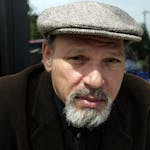It was to be, Winston Chrislock assumed, a common clandestine operation.
It was 1968, and the American doctoral student was in communist Czechoslovakia doing dissertation research. It was not unusual for a shady Czech acquaintance to line up opportunities to make purchases on the black market. So when the man told the grad student to go to "the film club," Chrislock "stuffed a bunch of $20 bills" into his pockets and headed to his appointment.
The meeting, however, was with Czech filmmaker Jindrich Polak, casting for a movie called "Nebesti Jezdci," or "Riders in the Sky" in English, based on a 1964 novel about Czechs and Slovaks who fought with the Royal Air Force (RAF) in World War II. Chrislock, it turned out, was the spitting image of an RAF flier.
He wound up in a movie that, over the decades, has proved hugely popular in the former Czechoslovakia. In April, the retired University of St. Thomas history professor returned to Prague to reunite with surviving cast members, was feted and signed autographs where the film once was forbidden. It was his only movie role.
"I wasn't very good," Chrislock admitted with a smile.
It was the Prague Spring, a brief and remarkable time of cultural openness behind the Iron Curtain, when a movie about Czechs working with the West could be made. Chrislock left the country in August 1968, just before an invasion by Warsaw Pact forces and months before a return to strict state control. "It was the greatest nine months of my life," he said of the time.
An accidental actor
Chrislock, a graduate student at Indiana University, was in Czechoslovakia studying the history of Czech social democracy. It wasn't long before he met Ivo Mares in a beer hall. Mares, whom Chrislock describes as nice, but a bit "oily," wanted to practice English. Chrislock wanted to practice Czech. Mares also introduced him to the area's black market and its hunger for American dollars.
Mares also knew Polak, a writer and director whose career spanned decades and was known for the 1963 film "Voyage to the End of the Universe." Polak had recently received permission from the Ministry of Culture to turn a novel by Filip Jansky, a Czech who'd served in the Royal Air Force during WWII, into a film.
Alice Lovejoy, an instructor and film historian at the University of Minnesota, said of Polak: "He was a very productive filmmaker, a very prolific filmmaker" who took advantage of cultural changes that began in 1963. She said that the year 1968 "was exceptional" in its openness to telling a story of young men who escaped the Nazi invasion of their country to later fight wearing British uniforms.
During casting, Polak complained to Mares about his difficulty in finding an actor who looked like a picture he had of an actual RAF flier. He showed Mares a picture "of my twin," Chrislock said. Mares told Polak he knew just the guy, and for a bottle of Johnnie Walker Red, he said, "I'll get him."
After an acceptable screen test, Chrislock was cast as "Tommy," a Scottish radio operator on a Wellington bomber. Later, after Chrislock struggled to concoct a Scottish accent, Tommy was made a Canadian.
"They said, 'You actually look better on the screen than you do in person,' " Chrislock said.
Over the next nine months, Chrislock and his bomber crew — three English-speaking amateurs and three Czech and Slovak professional actors — shot the movie in places like a Warsaw Pact air base and in a Prague square because they resembled English locales. The film premiered in November 1968 and played to good crowds before a cultural crackdown in May 1969 chased it from theaters.
Return as a star
After the collapse of communism in the late 1980s, the film returned to popularity. Chrislock, in the country at the time on a Fulbright scholarship, got a copy of the video.
Polak died in 2003. Chrislock couldn't attend a 2004 cast reunion after organizers couldn't deliver a promised airplane ticket. So he enthusiastically agreed to return to Prague over the first week of April when he was contacted for another reunion. He signed autographs for about 100 fans and gave a talk in Czech.
Looking back after a long teaching career, Chrislock admits that he was a bit smitten by the acting bug at the time. He even asked the director if Polak had a role in another film that Chrislock could play. Polak, he said, let him down gently:
"He said I'd had my shot."
James Walsh • 651-925-5041





